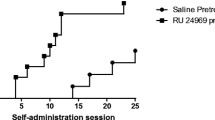Heading
Abstract
Rationale. Responding for conditioned reinforcement is increased by the dopamine releasing agent amphetamine, but reduced by drugs that enhance serotonin (5-HT) function. The amphetamine derivative 3,4-methylenedioxymethamphetamine (MDMA, Ecstasy) releases both monoamines.
Objectives. The primary purpose of this study was to examine the effects of MDMA on responding for conditioned reinforcement as well as on locomotor activity. The roles of several 5-HT receptor sub-types in mediating these behavioural effects of MDMA were also examined.
Methods. Locomotion was measured in photocell activity monitors. For conditioned reinforcement experiments thirsty rats learned to associate a conditioned stimulus (CS) with water in operant chambers. Subsequently, two response levers were available; responding on one lever delivered the CS, while responding on the second lever had no consequences. Drug effects on this operant response were measured.
Results. MDMA dose-dependently increased locomotion but reduced responding for conditioned reinforcement. This latter effect differs from that induced by amphetamine, which potentiates conditioned reinforcement responding. The stimulant effect of MDMA was attenuated by GR127935 and ketanserin, indicating facilitatory roles of 5-HT1B and 5-HT2A receptors in mediating this effect. The 5-HT2C antagonist SB242084 enhanced the stimulant effect of MDMA. Only SB242084 attenuated the suppressant effect of MDMA on responding for conditioned reinforcement.
Conclusions. The results show that 5-HT2A and 5-HT1B/1D receptors play a facilitatory role in mediating the stimulant effect of MDMA, whereas 5-HT2C receptors are inhibitory. Activation of 5-HT2C receptors also contributes to the deficit in operant responding. Multiple 5-HT receptor sub-types appear to contribute to the behavioural effects of MDMA.
Similar content being viewed by others
Author information
Authors and Affiliations
Additional information
Electronic Publication
Rights and permissions
About this article
Cite this article
Fletcher, P.J., Korth, K.M., Robinson, S.R. et al. Multiple 5-HT receptors are involved in the effects of acute MDMA treatment: studies on locomotor activity and responding for conditioned reinforcement. Psychopharmacology 162, 282–291 (2002). https://doi.org/10.1007/s00213-002-1104-4
Received:
Accepted:
Issue Date:
DOI: https://doi.org/10.1007/s00213-002-1104-4




